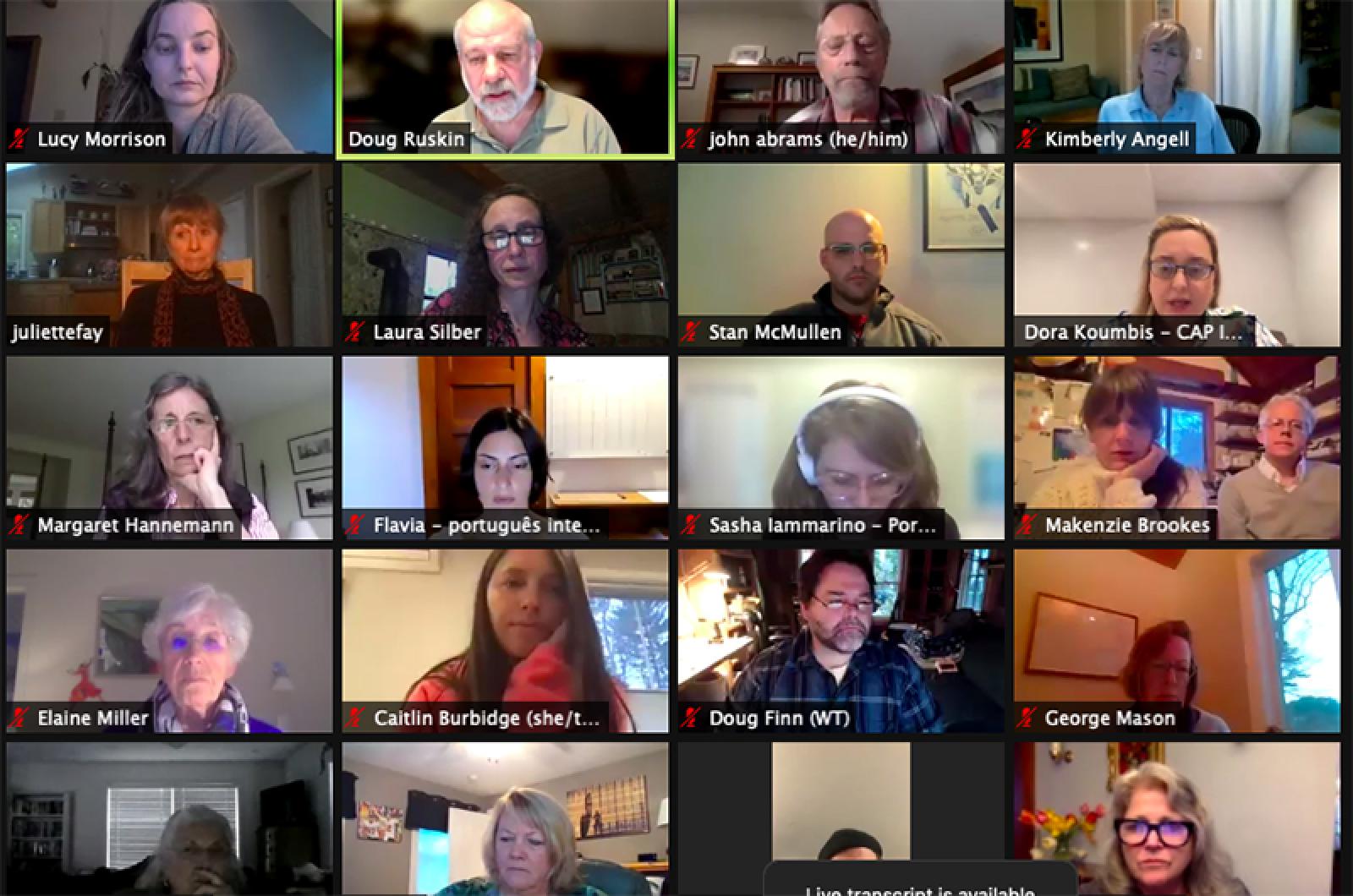Questions and compliments came from all directions at Monday night’s forum on the renewed effort to create a housing bank on Martha’s Vineyard, as organizers aired the long-term plan before the public.
The hour-and-a-half listening session was hosted by the Coalition to Create the Martha’s Vineyard Housing Bank, an ad hoc group of about 20 Islanders with the goal of creating a permanent funding source to advance year-round housing on the Island.
A second session is scheduled for Wednesday at 7 p.m.
Julie Fay, the former executive director of Martha’s Vineyard Community Services, and Arielle Faria, an administrator on the Edgartown affordable housing committee, are co-chairing the group. Laura Silber has been hired as a paid staffer to organize the effort.
The housing bank idea stretches back for nearly two decades, when the first attempt to pass legislation to create a transfer tax failed on Beacon Hill amid opposition from the real estate industry. A similar effort that would have used money from a new short-term rental tax was nixed on Vineyard town meeting floors in 2019.
But at the 135-person Zoom forum Monday night, organizers stressed the urgency this time around, against the backdrop of a housing shortage widely seen as unprecedented, even for the Vineyard.
In a poll conducted at the beginning of the forum, 62 per cent of respondents said they or someone they knew was in an unstable housing situation on the Island.
“The crisis has hit a catastrophic level we have never seen before . . . threatening our infrastructure, our public health system, our schools, the economic survival of our businesses, and the social and volunteer support systems so critical to the fabric of small town life,” Ms. Fay said. “We need a comprehensive, regional solution with long-range planning and funding appropriate to the scale with the problem.”
Presenting the plan, Ms. Fay and Ms. Silber said the housing bank would be modeled after the Martha’s Vineyard Land Bank and be funded by a transfer fee, paid by buyers, for transactions above a certain threshold, with the hope of raising $7 to $10 million annually.
The coalition plans to place a home rule petition question before voters at all six annual town meetings in 2022, and if the petition is approved, take it to the state legislature. Six other towns across the commonwealth have crafted similar proposals.
At the forum Monday, there were questions about the timeline, structure, and the decision to tax buyers rather than sellers. Coalition members cited two reasons for that decision.
“Basically, we felt that it was a more salable approach,” Doug Ruskin said. “Buyers are unknown to us, whereas sellers are our neighbors. That’s one consideration. The bigger one, frankly, is that we have to sell it to the legislature once it is approved. Indications are that there might be some preference [for a buyer tax] at the legislative level.”
Organizers acknowledged that the real estate industry, which has a powerful lobby, has long opposed transfer fees. But they said too that many Island real estate brokers are backing the housing bank this time around, and that the Cape Cod & Islands Association of REALTORS has softened its stance in recent years.
“This time, we are not going to let the real estate lobby get in our way,” said John Abrams, who moderated the forum.
Kaylea Moore, a legislative aide for state Rep. Dylan Fernandes, said the Cape and Islands delegation supports the proposal. Ms. Silber also said the Vineyard will be partnering with Nantucket, which has a group specifically designated to fighting the real estate lobby.
“We feel like there is more momentum behind this,” she said.
Panelists included land bank executive director James Lengyel, Dukes County Regional Housing Authority director David Vigneault, and Island Housing Trust executive director Philippe Jordi
All said the housing bank would likely prioritize building on already developed, rather than undeveloped, land. They also said legal issues prevent giving preference to people who grew up or were born on the Island.
And as the housing bank focuses on long-term, year-round housing, Adam Turner, executive director of the Martha’s Vineyard Commission, said a parallel effort is underway to form a task force for short-term summer worker housing.
He spoke to the immediate necessity of the housing bank.
“It’s got to happen. And if it doesn’t happen, it’s really going to hurt this place that we call home,” Mr. Turner said.
As the forum came to a close, participants flooded the Zoom comment section with compliments about the forum and the proposal. Denise Schepici, president and chief executive officer of Martha’s Vineyard Hospital, voiced her praise, saying that doctors and nurses were struggling to find housing, and that the hospital wholeheartedly endorsed the proposal.
“I’ve remained uncharacteristically silent through all of this because I’m just in awe and wonder of the effort here,” Ms. Schepici said.






Comments (29)
Comments
Comment policy »